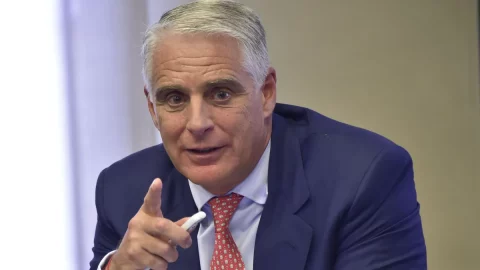Leaving the European Union would upset the economic and political set-up of the United Kingdom. David Cameron should almost certainly resign and his replacement would probably be Boris Johnson. The "Leave" front argues that, with the farewell to Brussels, the UK will also leave the single European market and will revoke the right of EU citizens to freely enter British territory. But there are many questions that Brexiteers are not answering. Here are ten.
1) HOW WILL THEY KEEP THE NUMBER OF IMMIGRANTS UNDER CONTROL?
To regulate immigration, proponents of leaving the EU want to introduce a points system similar to that adopted by Australia. The goal is to reduce the net flow of immigrants, bringing it to the order of tens of thousands. At the same time, however, the pro-Brexit front wants more non-EU immigrants. But how do they plan to achieve both of these objectives, given that the net migratory flow from non-EU countries is already 188 people?
2) WHAT PROTECTIONS WILL BRITISH PEOPLE LIVING OR TRAVELING IN EUROPE HAVE?
It is likely that, in the event of Brexit, the 1,2 million British now residing in other EU countries will be able to stay where they are. However, they risk having the rights they enjoy today restricted. What about Britons going abroad for a limited period, for example those who spend the summer in Spain but remain officially resident in the UK? What about tourists traveling to Europe? Will they need a visa, as Justice Minister Dominic Raab suggests?
3) HOW WILL THEY AVOID SCOTLAND'S SECESSION?
If Scotland wins no to Brexit, while the rest of the UK votes to leave the EU, will Johnosn or whoever is prime minister allow the Scots to hold a second referendum to leave London? And, if so, how can he convince them to stay in the UK, given that many of the specious arguments used by pro-Brexit propaganda could also be used by Scottish nationalists to make the case for secession?
4) SHOULD THE IRISH BORDER CLOSE?
Northern Ireland secretary of state Theresa Villiers is in favor of Brexit and says it won't be necessary. But former Chancellor of the Exchequer Nigel Lawson, who also sided with the “Leave” front, disagrees. Indeed, it is difficult to imagine how to prevent EU citizens from entering the UK if the border between the Republic of Ireland and Northern Ireland remains open. Anyone could fly to Dublin and easily travel across the UK from there. On the other hand, closing the border would hurt the Northern Irish economy and possibly jeopardize the peace process.
5) WHAT WILL BECOME OF COLLABORATION WITH THE EU IN FOREIGN POLICY?
The European Union has reacted to the Russian invasion of Crimea by imposing sanctions on Moscow and is trying to advance a peace process in Syria. If the UK leaves the EU, will it continue to support these initiatives? And how?
6) HOW WILL THEY FIGHT TERRORISM AND INTERNATIONAL CRIME?
To fight terrorism, cyber-crime and human trafficking, the European Union provides key weapons such as Europol, the European Arrest Warrants, the European Criminal Records Information System and the Schengen Information System for illegal immigration. How could the UK maintain access to these tools?
7) WILL THEY TRY TO DESTROY THE EUROPEAN UNION?
Some Brexit supporters, like Justice Minister Michael Gove, don't just want to leave the EU, they want to destroy it. In fact, Brexit could trigger the unraveling of the Union, a process that risks creating instability in countries close to Great Britain.
8) HOW WILL THEY FIX THE BUDGET HOLE?
According to most predictions, Brexit would hit the economy and blow a hole in Britain's public finances. How will politicians on the side of "Leave" keep their promise to transfer sums equivalent to current EU funds to farmers, scientists and poor regions of the UK? Will they cut spending on other budget items, raise taxes or increase the deficit?
9) HOW WILL THE NEGOTIATIONS FOR EXIT FROM THE EU CARRY ON?
In the event of Brexit, the UK will struggle to get a good deal, as the UK needs the EU more than the EU needs the UK. Will London still be part of the Union in 2020, as Gove claims? Or does he really think he is proceeding with blackmail, vetoing all European decisions until he gets what he asks for, as Gove would like?
10) WHAT TRADE DEAL WILL THEY NEGOTIATE?
Now that Brexit proponents have made clear their intention to abandon the European single market and end free movement, they cannot aim for a deal similar to those signed with the EU by Norway and Switzerland, which enjoy rather good access to the European market. Johnson floated the idea of using Canada's trade relations with the EU as a model, while Gove spoke of Albania. But neither of these two solutions would guarantee the UK access to the European market comparable to what it has today. And about half of British trade is linked to the EU market. As for the other 50%, the "Leave" front has never explained how it plans to replace the over 50 free trade agreements in force between the EU and other countries of the world such as Switzerland, South Korea, South Africa and Canada.
Original article by Jack Schickler at facts.org
Translated from English by Carlo Musilli





